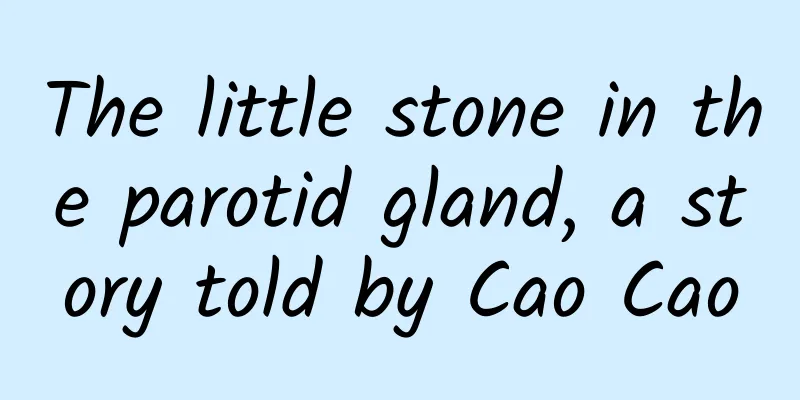The little stone in the parotid gland, a story told by Cao Cao

|
Almost every Chinese knows the story of "looking at plums to quench thirst". This story first appeared in the chapter "Falsehood" in the Southern Dynasty's "A New Account of Tales of the World". There are five short stories about Cao Cao in the same chapter, including the well-known "killing in a dream" plot, which later appeared in "Romance of the Three Kingdoms". Judging from the connection between the previous and subsequent stories, the author may have wanted to highlight that Cao Cao was a treacherous person. Some other stories seem very absurd and their authenticity is questionable. But when we modern people see the idiom "looking at plums to quench thirst", we don't feel it is completely negative, and we often think of Cao Cao's wise side. The reason why the story of "looking at plums to quench thirst" is so vivid may be that it is very reasonable and consistent with our daily life experience. In life, when we eat something sour, we will drool unconsciously. What's more, as long as we think of something sour, such as lemon, our mouth will naturally produce saliva. This is actually a conditioned reflex, because we already know how it feels after eating sour food, so as soon as the image of sour things appears in the brain, the instruction to "produce" saliva is issued in advance. The saliva in the human mouth mainly comes from the salivary glands, which include the parotid glands, submandibular glands, and sublingual glands. The parotid glands, as the largest salivary glands, are hidden deep in the cheeks on both sides of our face, like a pair of unknown "reservoirs". Once they receive an order, they will open the gates to release water and discharge saliva into the mouth through the parotid ducts. Like the Three Gorges Reservoir, the saliva secretion of the parotid glands is usually a long-lasting trickle, and a large flow is used to clear the inventory when needed. Saliva not only helps digest food, but also plays an important role in cleaning the mouth, antibacterial and anti-caries. When we see or think of sweet and sour food, the brain will send a signal to "open the gate" to stimulate the parotid glands to secrete a large amount of saliva. This is a conditioned reflex and a natural reaction of the body to prepare for the upcoming meal. But sometimes, when saliva is produced, sales become a problem. Because any sophisticated design cannot predict all possible failures, the parotid gland reservoir is no exception, and sometimes it will encounter the crisis of "barrier lake". There is a disease called parotid duct stones, which is a common disease that can cause "parotid dam lake". The exact cause of this disease has not yet been determined. At present, it is only known that minerals in the saliva are deposited and gradually form stones. The stones happen to get stuck and block the parotid duct, causing the saliva to be unable to be discharged normally. This is like a large stone in the reservoir being hit by the water flow to the dam, just blocking the outlet of the dam. Naturally, if the water cannot flow out, the water level will continue to rise, and the barrier lake crisis will appear. There are many such patients in life. When they see or taste acidic foods, they stimulate the parotid gland to secrete a lot of saliva. When the stones block the parotid duct, the saliva generated accumulates in the gland and cannot be discharged, and then swelling and pain in the parotid area occur. It can be seen that it is not a good thing for stones to appear anywhere in the body, and the parotid gland is no exception. In addition to the unsalable saliva, overcapacity can also be a problem. Seeing this, you will find that the parotid gland is one of the few glandular tissues that will change intuitively according to your thoughts. Clinically, we will also formulate corresponding strategies based on this characteristic of the salivary gland. For example, whenever I see patients who have undergone surgery for parotid or submandibular tumors during ward rounds, I will generally take special care of their families and tell them to eat "simple meals" and avoid spicy and sour foods. Moreover, sometimes I will emphasize that the "simple meals" here are not a joke, but really mean what it means. On the basis of balanced nutrition of the ingredients, use less seasoning and make it lighter. Simply put, it means "don't make it too delicious." Because most parotid surgeries are equivalent to a "reservoir renovation," eating more sour foods at this time is like heavy rainfall upstream and the collapse of the newly built embankment. Saliva is secreted in large quantities, and it is easy to seep out from weak wounds, eventually leading to prolonged salivary fistulas. When you read this article and I say the idiom “looking at the plum to quench thirst” again, do you also feel your mouth watering? |
<<: Ultrasound examination: the answer to women's abdominal discomfort
>>: Seven questions and answers about osteoporosis, for healthy bones
Recommend
How long does it take for female alopecia to heal itself?
Alopecia areata is called bald spots in many area...
Pictures of cesarean section vertical incision 2 years ago
Most people know that there are two types of abdo...
What to do if a woman's vagina is loose
It is well known that if a woman's vagina is ...
The pros and cons of thyroglobulin, calcitonin and thyroid cancer...
Author: Cui Wei, Researcher at the Cancer Hospita...
10 Beauty Lies You Can Fall For
Beauty lie 1: Acne should be treated as soon as p...
What is the difference between primary and secondary hypertension? How are they treated?
Author: Mi Yuhong, Chief Physician, Beijing Anzhe...
Passionate French kissing will make women more beautiful
According to a well-known Russian newspaper, scie...
What causes pain in the lower left side of a woman's abdomen?
If women often have pain in the left lower abdome...
How do women protect their ovaries?
Ovaries are very important for women. Ovaries are...
Does eating baked sweet potatoes often cause cancer? Not really. The sweet potatoes that really shouldn't be eaten are →
Rumor: "Baked sweet potatoes are delicious, ...
Do I need to fast before a painless abortion?
Nowadays, medical standards are very good. Many p...
What are the disadvantages of girls masturbating frequently?
Frequent masturbation will have an impact on your...
Can I have sex with uterine fibroids?
For women with uterine fibroids, all they need to...
What is the reason for black clots in menstrual blood?
As girls, we all know that normal menstruation is...
Menopause health tips
All women will enter menopause one day. Women in ...









